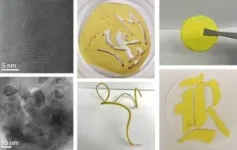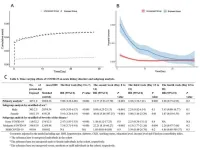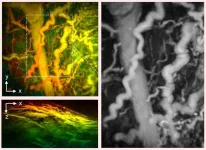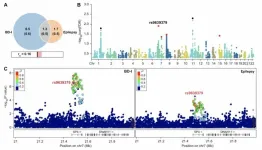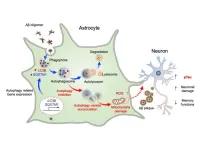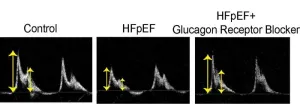(Press-News.org) HOUSTON – (Sept. 30, 2024) – Rice University engineers have developed an innovative way to make covalent organic frameworks (COFs), special materials that can be used to trap gases, filter water and speed up chemical reactions. COFs have the potential to address significant environmental challenges, including energy storage and pollution control. An example of that is their potential use in the decontamination of “forever chemicals” or per- and polyfluoroalkyl substances (PFAS).
Rice chemical engineer Rafael Verduzco and his team have described a new way to synthesize high-quality COFs at low cost and with high throughput in a study published in ACS Applied Materials and Interfaces that will be featured on the front cover of a future issue of the journal. The work includes a careful analysis of the benefits and drawbacks of different synthesis methods and details a versatile, cost-effective way to make COFs. This involves a multiflow microreactor and careful calibration of the input-output process.
“We built a small, continuous production system ⎯ like a minifactory on a lab bench ⎯ where the ingredients for COFs are mixed and reacted in a steady stream instead of all at once in a big container,” said Safiya Khalil, a Rice doctoral alumna who is the first author on the study.
The researchers also found that one of the COFs produced via flow synthesis was better than those made using other methods at breaking down perfluorooctanoic acid (PFOA), a PFAS compound associated with a number of health risks, including cancer and reproductive harm.
“This is an encouraging finding that adds to the growing evidence that COFs could emerge as a key player in the development of cleaner, more efficient technologies for contaminant removal,” said Verduzco, professor and associate chair of chemical and biomolecular engineering at Rice who is the corresponding author on the study.
COFs are crystalline polymers made of small, repeating units linked together into microscopic spongelike structures. These materials stand out for their porosity, large surface area and tunable molecular structure ⎯ features that could be harnessed for use in a wide range of applications, including semiconductors, sensors, drug delivery and filtration. However, the slow and expensive process of producing COFs has limited their broader deployment.
“We hope this method will make it easier to produce COFs in large quantities and help accelerate the discovery of new formulations,” said Khalil, who earned a Ph.D. in chemical and biomolecular engineering from Rice, where she was a part of Verduzco’s Polymer Engineering Laboratory.
Khalil likened the new method to making cookies to order in small batches rather than baking them all at once in one large batch. Although it was not the first time flow reactor synthesis was used to make COFs, the Rice researchers’ method stands out from previous approaches because it integrates the continuous synthesis and processing of two different COF chemistries, resulting in a more varied range of macroscopic formats.
“This method allows you to continuously have fresh-made cookies while controlling the temperature and mixing at each step to get the best quality every time,” Khalil said. “This process is faster, uses less energy and allows for better control over the final product.”
Traditional COF synthesis involves the use of high temperatures, high pressure and toxic organic solvents, limiting widespread production and use. The researchers’ flow synthesis strategy not only allows for faster COF production but also enables the creation of COFs with superior crystallinity.
The added proof that one of the newly synthesized COFs was very efficient at breaking down a “forever chemical” showcases the practical benefits of the new method. The breakdown process, known as photocatalytic degradation, is activated by light and occurs at room temperature.
“Imagine these COFs as powerful sponges with built-in ‘sunlight engines’ that can break down harmful chemicals much faster than current methods,” Khalil said. “One of the COFs we synthesized was more effective at breaking down PFOA than traditional materials such as titanium dioxide ⎯ a common photocatalyst used in pollution control.”
The research was supported by the Ministry of Education of the United Arab Emirates and the Welch Foundation (C-2124).
-30-
This news release can be found online at news.rice.edu.
Follow Rice News and Media Relations via Twitter @RiceUNews.
Peer-reviewed paper:
Continuous Synthesis and Processing of Covalent Organic Frameworks in a Flow Reactor | ACS Applied Materials & Interfaces | DOI: 10.1021/acsami.4c09577
Authors: Safiya Khalil, Abdullah Alazmi, Guanhui Gao, Cecilia Martínez-Jiménez, Ravindra Saxena, Shu-Yan Jiang, Jianhua Li, Salma Alhashim, Thomas Senftle, Angel Martí and Rafael Verduzco
https://doi.org/10.1021/acsami.4c09577
About Rice:
Located on a 300-acre forested campus in Houston, Rice University is consistently ranked among the nation’s top 20 universities by U.S. News & World Report. Rice has highly respected schools of architecture, business, continuing studies, engineering, humanities, music, natural sciences and social sciences and is home to the Baker Institute for Public Policy. With 4,574 undergraduates and 3,982 graduate students, Rice’s undergraduate student-to-faculty ratio is just under 6-to-1. Its residential college system builds close-knit communities and lifelong friendships, just one reason why Rice is ranked No. 1 for lots of race/class interaction, No. 2 for best-run colleges and No. 12 for quality of life by the Princeton Review. Rice is also rated as a best value among private universities by Kiplinger’s Personal Finance.
END
New synthesis strategy could speed up PFAS decontamination
Rice engineers demonstrate versatile, cost-effective way to make high-quality advanced materials
2024-09-30
ELSE PRESS RELEASES FROM THIS DATE:
COVID-19 linked to increased risk of acute kidney disorders: New study reveals time-varying effects
2024-09-30
Researchers from West China Hospital, Sichuan University, have conducted a study revealing a significant association between COVID-19 and acute kidney disorders (AKD), including acute kidney injury (AKI), that varies over time. The study, led by Dr. Li Chunyang and Dr. Zeng Xiaoxi from the West China Biomedical Big Data Center, was recently published in the journal Health Data Science.
COVID-19, known for its impact on the respiratory system, also affects other organs, including the kidneys. The study aimed to investigate the time-dependent effects of COVID-19 on acute kidney disorders. Using data from the ...
Medical imaging breakthrough could transform cancer and arthritis diagnosis
2024-09-30
A new hand-held scanner developed by UCL researchers can generate highly detailed 3D photoacoustic images in just seconds, paving the way for their use in a clinical setting for the first time and offering the potential for earlier disease diagnosis.
In the study, published in Nature Biomedical Engineering, the team show their technology can deliver photoacoustic tomography (PAT) imaging scans to doctors in real time, providing them with accurate and intricate images of blood vessels, helping inform patient care.
Photoacoustic ...
Genetic link between bipolar disorder and epilepsy unveiled in groundbreaking study
2024-09-30
Kunming, China - A team of researchers from the Chinese Academy of Sciences has uncovered compelling evidence of a genetic link between bipolar disorder type I (BD-I) and epilepsy, potentially revolutionizing our understanding of these complex neuropsychiatric conditions. The study, published in Genomic Psychiatry on September 30, 2024, reveals shared genetic variants and a causal relationship between the two disorders, opening new avenues for research and treatment.
Led by Dr. Ming Li from the Kunming ...
Social networks help people resolve welfare problems - but only sometimes, new research finds
2024-09-30
Lead researcher Dr Sarah Nason, from Bangor University’s School of History, Law and Social Sciences explained: “Debt, benefits, special educational needs, healthcare issues, these are everyday problems that many of us face, and it’s only natural to turn to people you know and trust for help and advice. However, we found that having to talk to more people or support services was an indicator that the problem was more complex and difficult to resolve.”
The team studied four distinct areas across England and Wales: Bryngwran, a village on Anglesey in North Wales; Deeplish, a district of Rochdale in Greater ...
Honey, I shrunk the city: What should declining Japanese cities do?
2024-09-30
Aging societies and population decline have been on the rise globally, but in Japan, the situation has exasperated tenfold. A staggering 36.21 million people, or 28.9% of the populace, are 65 and over. Further, 74.6% of Japan’s 1,747 cities are categorized as shrinking, with urban policies struggling to keep up with the decline. However, the factors that correlate with population changes in cities of varying sizes have not been clarified.
Dr. Haruka Kato, a junior associate professor at Osaka Metropolitan University, ...
New brain cell cleaner: astrocytes raise possibility of Alzheimer’s disease treatment
2024-09-30
A research team led by Dr. Hoon Ryu from the Korea Institute of Science and Technology (KIST, President Sang-Rok Oh) Brain Disease Research Group, in collaboration with Director Justin C. Lee of the Institute for Basic Science (IBS, President Do-Young Noh) and Professor Junghee Lee from Boston University Chobanian & Avedisian School of Medicine, has uncovered a new mechanism involving astrocytes for treating Alzheimer’s disease (AD) and proposed a novel therapeutic target. In this study, the researchers revealed that autophagy pathway ...
American Academy of Pediatrics announces its first clinical practice guideline for opioid prescriptions
2024-09-30
Media contacts:
Lisa Robinson, lrobinson@aap.org
Alex Hulvalchick, ahulvalchick@aap.org
American Academy of Pediatrics Announces its First Clinical Practice Guideline for Opioid Prescriptions
Pediatricians should prescribe opioids for pain when necessary, with recommended precautions in place to increase safety, according to a clinical practice guideline released during the AAP 2024 National Conference & Exhibition
ORLANDO, Fla.--The American Academy of Pediatrics has published its first clinical ...
Drivers of electric vehicles are more likely to be at fault in road traffic crashes than drivers of petrol and diesel cars
2024-09-30
Drivers of electric vehicles (EVs) are more likely to be involved in at-fault road traffic accidents than drivers of petrol and diesel cars, research by Lero, the Research Ireland Centre for Software, at University of Limerick and Universitat de Barcelona, reveals.
In the analysis of insurance claims and data from onboard sensors, due to be published in the November issue of the journal Accident Analysis & Prevention, the Lero researchers reveal a number of key findings:
Electric and hybrid drivers exhibit different behaviours ...
Duke-NUS study proposes new heart failure treatment targeting abnormal hormone activity
2024-09-30
Duke-NUS scientists and their collaborators have discovered a potential new treatment for heart failure with preserved ejection fraction (HFpEF), a type of heart disease that is notoriously difficult to treat. The team discovered that the diseased heart cells had high levels of glucagon activity, a pancreatic hormone that raises blood sugar (glucose) levels. Armed with this novel insight, the scientists demonstrated that a drug that blocks the hormone’s activity, can significantly improve heart ...
People who experience side effects from cranial radiation therapy may recover full neurocognitive function within months
2024-09-29
WASHINGTON, September 29, 2024 — A substantial number of patients with brain metastases who experience cognitive side effects following radiation therapy may fully regain cognitive function, according to a pooled analysis of three large, phase III clinical trials. Recovery was more likely for people treated with conformal, or highly targeted, radiation techniques, compared to standard whole-brain treatment. The findings will be presented today at the American Society for Radiation Oncology (ASTRO) ...
LAST 30 PRESS RELEASES:
Students run ‘bee hotels’ across Canada - DNA reveals who’s checking in
SwRI grows capacity to support manufacture of antidotes to combat nerve agent, pesticide exposure in the U.S.
University of Miami business technology department ranked No. 1 in the nation for research productivity
Researchers build ultra-efficient optical sensors shrinking light to a chip
Why laws named after tragedies win public support
Missing geomagnetic reversals in the geomagnetic reversal history
EPA criminal sanctions align with a county’s wealth, not pollution
“Instead of humans, robots”: fully automated catalyst testing technology developed
Lehigh and Rice universities partner with global industry leaders to revolutionize catastrophe modeling
Engineers sharpen gene-editing tools to target cystic fibrosis
Pets can help older adults’ health & well-being, but may strain budgets too
First evidence of WHO ‘critical priority’ fungal pathogen becoming more deadly when co-infected with tuberculosis
World-first safety guide for public use of AI health chatbots
Women may face heart attack risk with a lower plaque level than men
Proximity to nuclear power plants associated with increased cancer mortality
Women’s risk of major cardiac events emerges at lower coronary plaque burden compared to men
Peatland lakes in the Congo Basin release carbon that is thousands of years old
Breadcrumbs lead to fossil free production of everyday goods
New computation method for climate extremes: Researchers at the University of Graz reveal tenfold increase of heat over Europe
Does mental health affect mortality risk in adults with cancer?
EANM launches new award to accelerate alpha radioligand therapy research
Globe-trotting ancient ‘sea-salamander’ fossils rediscovered from Australia’s dawn of the Age of Dinosaurs
Roadmap for Europe’s biodiversity monitoring system
Novel camel antimicrobial peptides show promise against drug-resistant bacteria
Scientists discover why we know when to stop scratching an itch
A hidden reason inner ear cells die – and what it means for preventing hearing loss
Researchers discover how tuberculosis bacteria use a “stealth” mechanism to evade the immune system
New microscopy technique lets scientists see cells in unprecedented detail and color
Sometimes less is more: Scientists rethink how to pack medicine into tiny delivery capsules
Scientists build low-cost microscope to study living cells in zero gravity
[Press-News.org] New synthesis strategy could speed up PFAS decontaminationRice engineers demonstrate versatile, cost-effective way to make high-quality advanced materials


